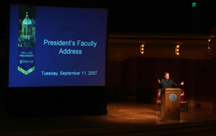
Now two years into his presidency, Rev. John I. Jenkins, C.S.C., says he is convinced that Notre Dames success lies in its distinctive identity as a Catholic university, even as its achievements in both undergraduate teaching excellence and research grow stronger.
In his annual address to the faculty Tuesday (Sept. 11), Father Jenkins made note of the ways in which the Universitys research and undergraduate experiences are improving, and the reasons why it should and must grow more influential as an agent of religious understanding.
At a time when religious understanding is low, hostility is high, and healing dialogue is desperately needed, this is a role Notre Dame is not only able to play, we are, I believe, obliged to play it,he said.
Regarding the Universitys research profile, he complimented faculty research and scholarship endeavors, which resulted in a 16 percent increase in outside funding, to a record-breaking $83 million. Furthermore, in the past eight years, faculty members have won more grants from the National Endowment for the Humanities than the faculties of any other university in the U.S.
How the outside world, or peers, perceive Notre Dames research agenda is likely to be revised, as updated rankings of the National Research Council (NRC) are released. NRC rankings are among those weighed by the Association of American Universities, an organization of the nations preeminent research institutions. Although not yet a member, Notre Dame aspires to become one, and its election, Father Jenkins said,is an achievable goal in the coming years.
He added:I want to emphasize that our primary goal is not to join an elite club simply for the sake of prestige or pride.Our goal, rather, is to be the sort of institution that is accurately judged to be in such a group, and to reap the benefits of association, information and reputation that membership can bring.
In addition to research funding, the Investment Office has provided the University with financial stability, and the Development Office two weeks ago passed the $1 billion mark in its efforts to raise $1.5 billion through theSpirit of Notre Damecapital campaign, which launched last spring.
The disciplined and careful investment of its resources also will be key to the Universitys growing success. Father Jenkins noted that a Strategic Academic Planning Committee soon would be accepting proposals on research initiatives to be funded through monies set aside by the Board of Trustees. Those initiatives are expected to be announced by Provost Thomas G. Burish in the spring; the Board has thus far set aside $25 million in one-time funding and an additional $5 million in annual recurring money.
Some may see conflict in the Universitys dual goals to offer unsurpassed undergraduate education and to become a premier research institution. In contrast, Father Jenkins sees the two goals as unifying, as faculty-mentors enhance undergraduate research opportunities.
When distinguished faculty are available to teach and advise students, the thrill of research and discovery becomes part of the undergraduate experience in a way that is impossible at a four-year college,he said.
Father Jenkins reported that he has asked Dennis Jacobs, vice president and associate provost, to oversee a dialogue on how the University can increase the number of undergraduates who opt to enter doctoral programs. Currently, only 5 percent of Notre Dame undergraduates become doctoral candidates. Encouraging more to do so can be accomplished through the commitments of faculty members, who inspire by mentoring and also lead by creating classrooms wherewe become a fellow inquirer with our students, seeking to understand, persevering through frustrations and dead ends, and sharing the exhilaration of discovery,Father Jenkins said.
If our aspiration is to train graduates who will be leaders for the future, we must do a better job of graduating intellectual leaders.
Leadership also was a key point in Father Jenkinsreflections on the Universitys Catholic character. As announced last year, a Provost Office committee has been considering how to seek and hire highly qualified Catholic faculty. Forthcoming, he said, is a brief statement of the rationale for hiring faculty for our Catholic mission.
It will state why we seek faculty who are Catholic and faculty who are of other faith traditions and of none, and how each can contribute to this Catholic university,he said.This document will, I hope, be a guide for seeking great scholars who will contribute to the distinctive mission of Notre Dame.
While seeking Catholic scholars, Father Jenkins said, he remains committed to welcoming and learning from faculty of all faith.
We must be a place where religious belief and unbelief are in dialogue, and therefore we are enriched by those who do not share religious faith, but are willing to engage in serious discussion with those who do,he said.
In a final note, Father Jenkins expressed appreciation for deans and the officers, who have worked to better integrate the interests and activities of the academic and administrative sides of the institution. He has established five leadership committees three that study initiatives in the areas of undergraduate education, research and Catholic mission. Two study the additional goals of creating a culture of continuous improvement, innovation, and excellence in service supporting the Universitys mission, and communicating strategically and effectively to internal and external constituencies.
If the effort to enhance collaboration and cooperation remains only at the level of the central University administration, its effect will be limited,he concluded.I ask you faculty and academic leaders, as I ask all at the University, to deepen this spirit of collaboration and cooperation in your work and responsibilities.
TopicID: 24447